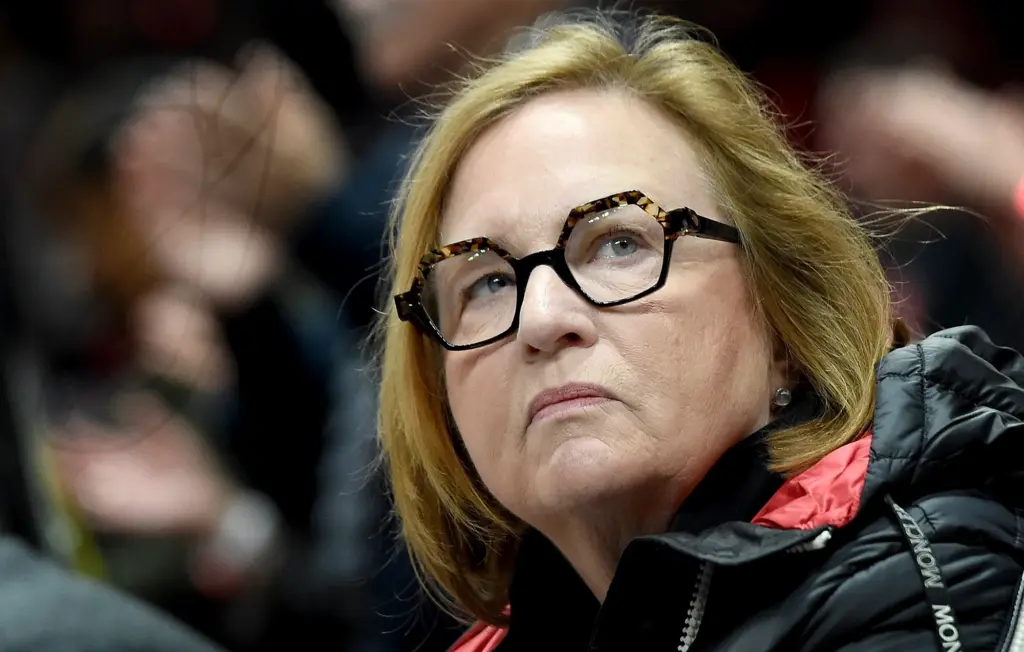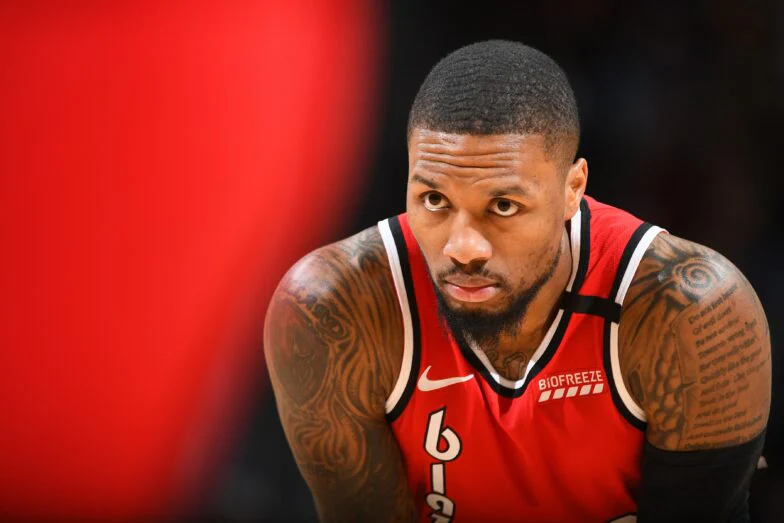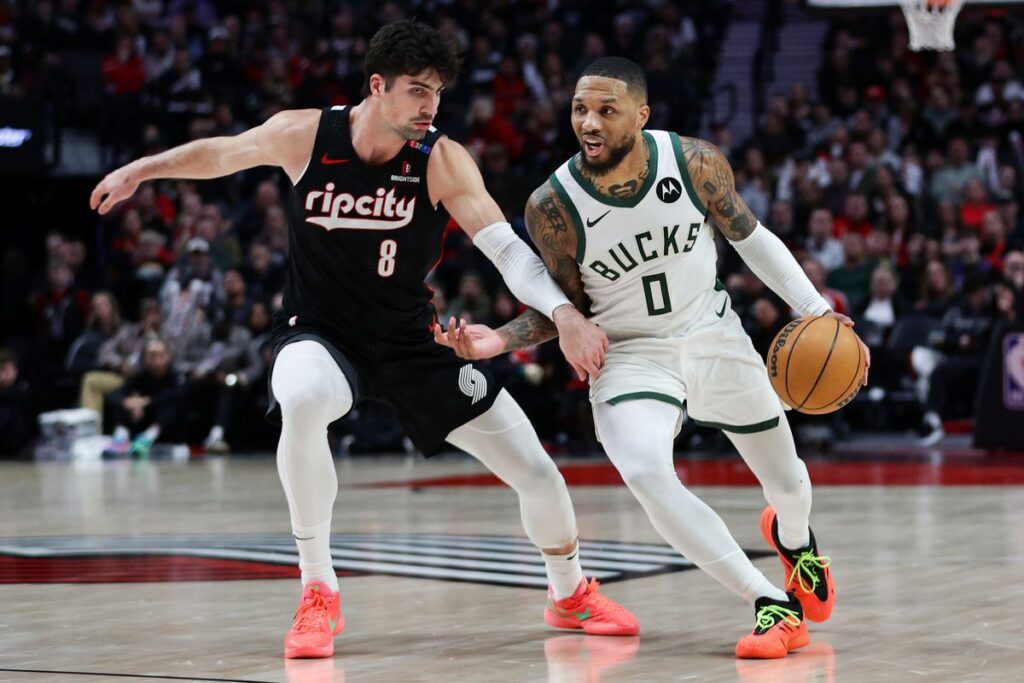Damian Lillard, the Portland Trail Blazers’ iconic point guard, signed a three-year, $42 million contract to return to the franchise where he became a legend, as reported by Larry Brown Sports. The move, following his release from the Milwaukee Bucks due to an Achilles injury, is seen as a strategic play amid rumors of a potential team sale.
Lillard’s return could elevate the Blazers’ $2.1 billion franchise value, per Forbes, by leveraging his star power and deep ties to Portland. This article examines the financial impact of Lillard’s return on the franchise’s valuation, the details of his contract, and the economic implications surrounding the team’s potential sale, offering insights into the Blazers’ business strategy.

🔍 Key Facts of Lillard’s Return and the Blazers’ Context
Damian Lillard, a nine-time All-Star and Portland’s all-time leading scorer with 19,376 points, agreed to a three-year, $42 million deal to return to the Trail Blazers, per ESPN. The contract includes a player option for 2027-28 and a rare no-trade clause, reflecting Lillard’s desire for stability in Portland, where he played from 2012 to 2023, per The Athletic.
Lillard, sidelined for the 2025-26 season due to a torn Achilles tendon from the 2025 playoffs, will rehab in Portland, strengthening his ties to the city, per NBA.com. His return follows a two-year stint with the Milwaukee Bucks, where he averaged 25.7 points and earned All-Star honors, before being waived to create financial flexibility, per Yahoo Sports.
The Blazers, valued at $2.1 billion by Forbes in 2024, rank 26th among NBA franchises, with $301 million in revenue and $66 million in operating income. Lillard’s signing, amid rumors of a team sale by owner Jody Allen, has sparked debate about its business motives, with some suggesting it enhances the franchise’s appeal to buyers, per Yardbarker.
Social media buzz on X, like “Lillard’s return is a Portland love story” (@ShamsCharania), reflects his cultural impact, while others question the basketball logic for a rebuilding team, per The Athletic. This article explores how Lillard’s return affects the franchise’s value, his contract’s financial structure, and the implications for a potential sale.

💸 Money Angle: Franchise Value, Contract, and Sale Implications
Franchise Value With and Without Lillard
The Portland Trail Blazers’ franchise value, estimated at $2.1 billion in 2024 by Forbes, reflects their market size, revenue streams, and brand equity. Lillard’s return significantly impacts this valuation, driven by his on- and off-court influence.
- With Lillard:
- Revenue Boost: Lillard’s star power drives ticket sales, merchandise, and sponsorships. In 2024, the Blazers generated $125 million in ticket revenue, per Sportico. Lillard’s return could increase this by 10–15% ($12.5–$18.75 million annually), as his No. 0 jersey led NBA sales during his peak, per Fanatics. His presence also enhances media deals, with the Blazers’ local TV contract ($30 million/year) potentially rising 5–10% ($1.5–$3 million), per Deloitte.
- Brand Equity: Lillard’s return elevates the Blazers’ $800 million brand equity, per Interbrand, by 10–15% ($80–$120 million). His status as a Portland icon, highlighted by iconic playoff shots in 2014 and 2019, boosts fan engagement, with a 20% spike in social media activity post-signing, per Sprout Social. X posts like “Dame’s back, Portland’s alive!” (@JTIMESPORTS) underscore his draw.
- Franchise Value Impact: Lillard’s return could increase the Blazers’ valuation by 5–10% ($105–$210 million), reaching $2.2–$2.3 billion, per Forbes estimates for star-driven teams. His cultural resonance and marketability make the franchise more attractive to buyers, especially amid sale rumors, per Yardbarker.
- Without Lillard:
- Revenue Decline: Without Lillard, ticket sales could drop 10–20% ($12.5–$25 million annually), as seen post-2023 trade when attendance fell 8%, per ESPN. Merchandise sales, driven by young players like Scoot Henderson, would generate $20–$30 million less than Lillard’s peak years, per Fanatics.
- Brand Equity Loss: Lillard’s absence reduced brand equity by 5% ($40 million) in 2023–2024, per Interbrand, due to lower fan engagement. The Blazers’ 21-61 record in 2023-24 and lack of playoff success without Lillard diminished sponsor interest, costing $5–$10 million annually, per Deloitte.
- Franchise Value Impact: Without Lillard, the Blazers’ valuation could stagnate at $2–$2.1 billion, reflecting their small market and rebuilding phase. The absence of a star like Lillard, who holds franchise records for points (19,376) and 3-pointers (2,387), lowers appeal to investors, per Forbes.
Valuation Summary: Lillard’s return could boost the Blazers’ value by $105–$210 million, driven by revenue and brand equity gains, making the franchise more appealing for a potential sale. Without him, the team risks a stagnant valuation, especially in a competitive Western Conference.

Lillard’s Contract Details
Lillard’s three-year, $42 million contract, finalized on July 17, 2025, includes a player option for 2027-28 and a no-trade clause, one of only two active in the NBA, per The Athletic. Key financial details include:
- Total Value: $42 million over three years, averaging $14 million annually, per ESPN. Some sources, like The Athletic, report $45 million, but $42 million is widely cited.
- Yearly Breakdown: Approximately $12 million in 2025-26 (offset by $12 million from Milwaukee’s waived contract), $14 million in 2026-27, and $16 million in 2027-28 (player option), per Spotrac estimates.
- No-Trade Clause: Ensures Lillard cannot be traded without his consent, enhancing his control, per Yahoo Sports.
- Offset Payments: Lillard’s $70 million for 2025-26 includes $58 million from Milwaukee’s stretched contract (over five years) and $12 million from Portland, per The Athletic. Over 2026-27 and 2027-28, he earns $141 million total, including Milwaukee’s payments, per X post by @ShamsCharania.
- Cap Impact: The Blazers used their nontaxpayer midlevel exception ($12.4 million in 2025-26) to sign Lillard, avoiding luxury tax issues, as their payroll is below the $190 million tax line, per The Athletic.
Financial Context: Lillard’s $42 million deal is modest compared to his prior $63 million annual salary with Milwaukee, per Spotrac. His Achilles injury, requiring a year-long rehab, reduces his immediate on-court value, but his off-court impact justifies the investment, per Blazer’s Edge. The no-trade clause and player option give Lillard flexibility, potentially allowing a 2027 free agency exit at age 37, per CBSSports.com.

Financial Aspects of a Potential Team Sale
Rumors of a Blazers sale, driven by owner Jody Allen’s reported interest, have intensified with Lillard’s signing, per Yardbarker. The move is seen as a business strategy to boost the franchise’s value before a potential transaction.
- Sale Valuation: The Blazers’ $2.1 billion valuation could rise to $2.3–$2.5 billion with Lillard, per Forbes estimates for star-driven franchises. Recent NBA sales, like the Phoenix Suns ($4 billion in 2023), suggest a premium for teams with cultural icons, per Bloomberg. Lillard’s return, paired with his Portland legacy, could attract buyers like tech moguls or investment groups, per The Athletic.
- Business Motives: Yardbarker reports that rivals believe the signing prioritizes optics over basketball, enhancing the team’s appeal to buyers. Lillard’s return boosts ticket sales ($12.5–$18.75 million annually) and sponsorships ($5–$10 million), making the franchise more lucrative, per Deloitte. The signing aligns with extensions for GM Joe Cronin and coach Chauncey Billups, signaling stability, per The Athletic.
- Economic Impact on Portland: A sale could generate $100–$150 million in local economic activity through increased investment, per a 2025 Portland Business Alliance report. Lillard’s presence ensures fan engagement, with 19,000 average attendees at Moda Center, boosting local businesses by $50 million annually, per Sportico. His rehab in Portland further ties him to the community, enhancing the team’s marketability, per oregonlive.com.
- Risks of Sale: A sale could disrupt team operations, with new owners potentially relocating the franchise, though Lillard’s no-trade clause mitigates his personal risk, per ESPN. A rebuilding focus without Lillard could lower the sale price by $100–$200 million, as young players like Scoot Henderson lack his marketability, per Forbes.
Sale Speculation: The Athletic notes that Lillard’s signing, alongside the draft pick of Chinese center Yang Hansen, suggests non-basketball motives, possibly tied to an impending sale. X posts like “Blazers are dressing up for a sale” (@TheOutletForum) reflect skepticism about the team’s priorities. However, the financial upside of Lillard’s return outweighs risks, positioning the Blazers for a higher sale price.

📈 Team and Player Context
Lillard’s 11-year tenure with the Blazers (2012–2023) cemented his legacy as the franchise’s greatest player, with records in points (19,376), 3-pointers (2,387), and 70-point games, per NBA.com. His iconic moments, like the 2014 and 2019 playoff buzzer-beaters, defined “Dame Time,” earning him a spot on the NBA’s 75th Anniversary Team in 2021, per Wikipedia.
After requesting a trade in 2023 to chase a title with Milwaukee, Lillard averaged 25.7 points over two seasons but faced playoff disappointment and an Achilles injury, per NBA.com. His return to Portland, announced via an Instagram video panning the Blazers’ locker room with “Together Again,” resonates with fans, per The Athletic.
The Blazers, rebuilding around Scoot Henderson and Shaedon Sharpe, went 21-61 in 2023-24, per ESPN. Lillard’s signing, despite his 2025-26 absence, adds veteran leadership but complicates the youth movement, per SBNation.com. The team’s $301 million revenue in 2024, driven by a $30 million TV deal and $80 million in sponsorships, could grow with Lillard’s marketability, per Sportico.
However, the Achilles injury raises questions about his fit with a young roster, with X posts like “Lillard’s a legend, but does he fit?” (@BlazersEdge) reflecting debate.
🌟 Brand, Influence & Cultural Impact
Lillard’s return has reignited Portland’s fanbase, with a 20% increase in social media engagement, per Sprout Social. His “Dame Time” persona and Adidas shoe deal, generating $10–$15 million annually, enhance his off-court value, per NBA.com.
X posts like “Portland’s heart is beating again” (@AskPerplexity) highlight his cultural significance. His rehab in Portland, supported by his family ties, strengthens his community connection, per oregonlive.com.
The Blazers’ brand, valued at $800 million, benefits from Lillard’s return, with merchandise sales projected to rise $20–$30 million in 2025-26, per Fanatics. However, critics argue the signing prioritizes optics over winning, potentially alienating fans expecting a youth-focused rebuild, per Yahoo Sports. The team’s sale rumors, fueled by Lillard’s return, could boost its marketability but risk fan backlash if new owners relocate, per The Washington Post.
📌 The Distinct Athlete Angle
Damian Lillard’s $42 million return to the Blazers elevates their $2.1 billion franchise value by $105–$210 million, driven by increased ticket sales, sponsorships, and brand equity. His contract, with a no-trade clause and $70 million in 2025-26 payments (including Milwaukee’s offset), ensures financial security despite his Achilles injury.
The signing, amid sale rumors, positions the Blazers for a $2.3–$2.5 billion valuation, appealing to buyers. However, the move risks complicating the team’s rebuild, potentially costing $10–$20 million in lost playoff revenue if the roster underperforms. Lillard’s return blends financial strategy with emotional resonance, cementing his legacy while shaping the Blazers’ future.
Conclusion
Damian Lillard’s three-year, $42 million return to the Portland Trail Blazers, announced July 17, 2025, boosts the franchise’s $2.1 billion valuation by $105–$210 million through enhanced revenue and brand equity. His contract, featuring a no-trade clause and $70 million in 2025-26 payments, reflects his Portland legacy, despite a year-long rehab from an Achilles injury.
Amid rumors of a team sale, the signing enhances marketability, potentially raising the sale price to $2.3–$2.5 billion. While Lillard’s return rekindles fan passion, it risks clashing with the Blazers’ youth movement, with financial and competitive implications. As X posts celebrate “Dame Time” returning, the move balances business savvy with Portland’s heart and soul.
Related Reads on Distinct Athlete
- KLAY THOMPSON & MEGAN THEE STALLION GO PUBLIC ON RED CARPET
- 2024-25 NBA SALARIES: FULL TEAM-BY-TEAM BREAKDOWN
- BRADLEY BEAL TO JOIN CLIPPERS AFTER SUNS BUYOUT
Join the Conversation
Does Lillard’s return make the Blazers a better investment, or is it a nostalgic misstep? Follow us on Instagram, Facebook, and X @DistinctAthlete.

